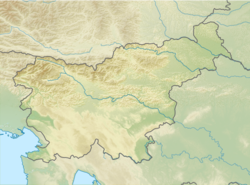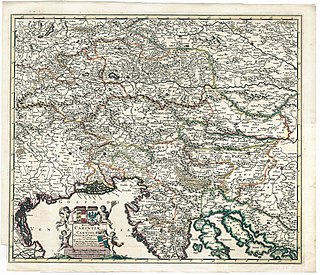
The history of Slovenia chronicles the period of the Slovenian territory from the 5th century BC to the present. In the Early Bronze Age, Proto-Illyrian tribes settled an area stretching from present-day Albania to the city of Trieste. The Slovenian territory was part of the Roman Empire, and it was devastated by the Migration Period's incursions during late Antiquity and the Early Middle Ages. The main route from the Pannonian plain to Italy ran through present-day Slovenia. Alpine Slavs, ancestors of modern-day Slovenians, settled the area in the late 6th Century AD. The Holy Roman Empire controlled the land for nearly 1,000 years, and between the mid-14th century and 1918 most of Slovenia was under Habsburg rule. In 1918, most Slovene territory became part of the Kingdom of Serbs, Croats, and Slovenes, and in 1929 the Drava Banovina was created within the Kingdom of Yugoslavia with its capital in Ljubljana, corresponding to Slovenian-majority territories within the state. The Socialist Republic of Slovenia was created in 1945 as part of federal Yugoslavia. Slovenia gained its independence from Yugoslavia in June 1991, and today it is a member of the European Union and NATO.
The politics of Slovenia takes place in a framework of a parliamentary representative democratic republic, whereby the Prime Minister of Slovenia is the head of government, and of a multi-party system. Executive power is exercised by the Government of Slovenia. Legislative power is vested in the National Assembly and in minor part in the National Council. The judiciary of Slovenia is independent of the executive and the legislature. Slovenia is a Member State of the European Union and is represented in the Council of the EU and through elections to the European Parliament.

Janez Drnovšek was a Slovenian liberal politician, President of the Presidency of Yugoslavia (1989–1990), Prime Minister of Slovenia and President of Slovenia (2002–2007).

The Slovenian Democratic Party, formerly the Social Democratic Party of Slovenia, is a conservative parliamentary party; it is also one of the largest parties in Slovenia, with approximately 30,000 reported members in 2013.

The Slovenian People's Party is a conservative, agrarian, Christian-democratic political party in Slovenia. Formed in 1988 under the name of Slovenian Peasant Union as the first democratic political organization in Yugoslavia, it changed its name to Slovenian People's Party in 1992. On 15 April 2000 it merged with the Slovene Christian Democrats to form the SLS+SKD Slovenian People's Party, and changed its name in 2001 to Slovenian People's Party.
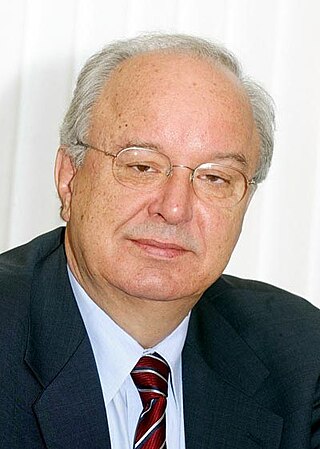
Andrej Bajuk, also known in Spanish as Andrés Bajuk was a Slovene politician and economist. He served briefly as Prime Minister of Slovenia in the year 2000, and was Minister of Finance in the centre-right government of Janez Janša between 2004 and 2008. He was the founder and first president of the Christian Democratic party called New Slovenia.
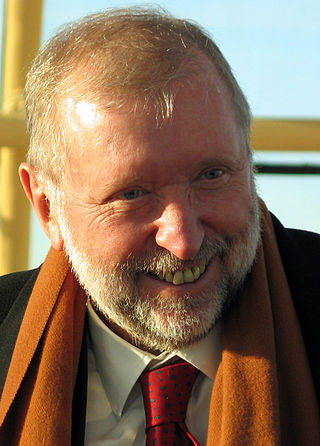
Dimitrij Rupel is a Slovenian politician.
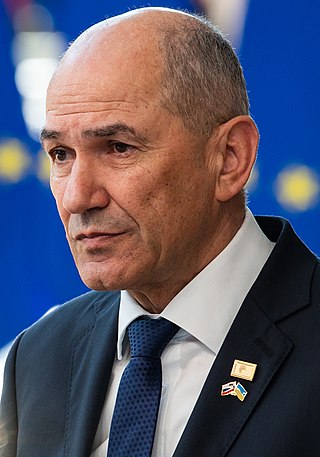
Ivan Janša, baptized and best known as Janez Janša, is a Slovenian politician who served three times as a prime minister of Slovenia, a position he had held from 2004 to 2008, from 2012 to 2013, and from 2020 to 2022. Since 1993, Janša has led the Slovenian Democratic Party, which has emerged as the pre-eminent Slovenian conservative party. Janša lost his fourth bid for prime minister in April 2022, his party defeated by the Freedom Movement party.

Ljubljana Jože Pučnik Airport, also known by its previous name Brnik Airport, is the international airport serving Ljubljana and the largest airport in Slovenia. It is located near Brnik, 24 km (15 mi) northwest of Ljubljana and 9.5 km (5.9 mi) east of Kranj, at the foothills of Kamnik–Savinja Alps.

The Ten-Day War, or the Slovenian War of Independence, was a brief armed conflict that followed Slovenia's declaration of independence from Yugoslavia on 25 June 1991. It was fought between the Slovenian Territorial Defence together with Slovene Police and the Yugoslav People's Army. It lasted from 27 June 1991 until 7 July 1991, when the Brioni Accords were signed.

Janko Prunk is a Slovenian historian of modern history. He has published articles and monographs on analytical politology, modern history, the genesis of modern political formations, and the history of social and political philosophy in Slovenia. He has also written on the history of political movements in Europe from the end of the 18th century until today, especially about Slovene Christian socialism and the history of Slovenian national questions.
The JBTZ trial or the JBTZ affair, also known as the Ljubljana trial or the Trial against the Four was a political trial held in a military court in Slovenia, then part of Yugoslavia in 1988. The defendants, Janez Janša, Ivan Borštner, David Tasić and Franci Zavrl, were sentenced to between six months' and four years' imprisonment for "betraying military secrets", after being involved in writing and publishing articles critical of the Yugoslav People's Army. The trial sparked great uproar in Slovenia, and was an important event for the organization and development of the liberal democratic opposition in the republic. The Committee for the Defence of Human Rights was founded on the same day of the arrest, which is generally considered as the beginning of the so-called Slovenian Spring.

Presidential elections were held in Slovenia in October and November 2007 to elect the successor to the second President of Slovenia Janez Drnovšek. France Cukjati, the President of the National Assembly, called the elections on 20 June 2007.

Jože Pučnik was a Slovenian public intellectual, sociologist and politician. During the communist regime of Josip Broz Tito, he was one of the most outspoken Slovenian critics of dictatorship and lack of civil liberties in SFR Yugoslavia.

Janez Janša is one of the three contemporary artists who changed their names in 2007 to Janez Janša, the name of the Slovenian centre-right politician Janez Janša. He is an editor, theatre and film director, and contemporary performing artist.

Milan Zver is a Slovenian politician and Member of the European Parliament (MEP) from Slovenia. He is a member of the Slovenian Democratic Party, part of the European People's Party. He is the Vice-President of the Slovenian Democratic Party. He served as Minister of Education and Sports from 2004 to 2008.

Janez Podobnik is a Slovenian conservative politician.

Igor Bavčar is a Slovenian politician and manager. He rose to prominence during the Slovenian spring, when he served as chairman of the Committee for the Defence of Human Rights, the largest independent civil society movement in the Socialist Republic of Slovenia. He was the Slovenian Minister of Interior during the Slovenian war of independence in June 1991, and coordinated Slovenian defence forces together with the Minister of Defence Janez Janša. He remained one of the most influential political figures in Slovenia until 1992, and remained an important member of the political establishment until 2002, when he left politics to engage in the private sector.
Nikolas Vogel was an Austrian-German film actor and news camera operator. Nikolas Vogel belonged to a family of famous actors and he also became an actor. Vogel left the acting profession to report the news and worked for a short time as journalist before he was killed in the Ten-Day War as Yugoslavia was dividing in the aftermath of Marshall Josip Broz Tito's death. Vogel was killed in a missile incident along with his Austrian colleague Norbert Werner.

Georgia–Slovenia relations are the bilateral relations between Georgia and Slovenia, two European nations with a communist past that established their bilateral ties in 1993. Their relations have been highly represented with a close diplomatic partnership, with Slovenia being one of the staunch supporters of Georgia's territorial integrity and pro-Western path. Both nations are members of the Council of Europe.
